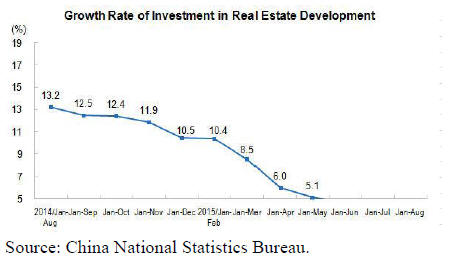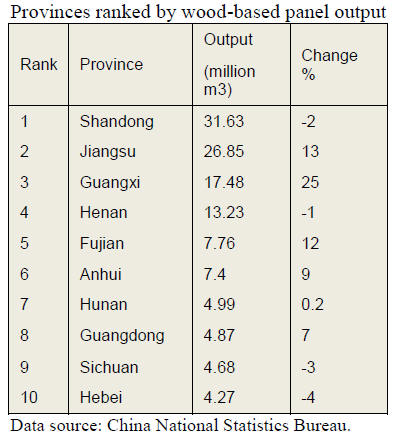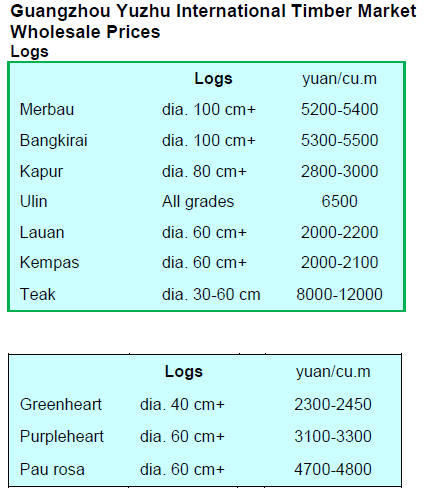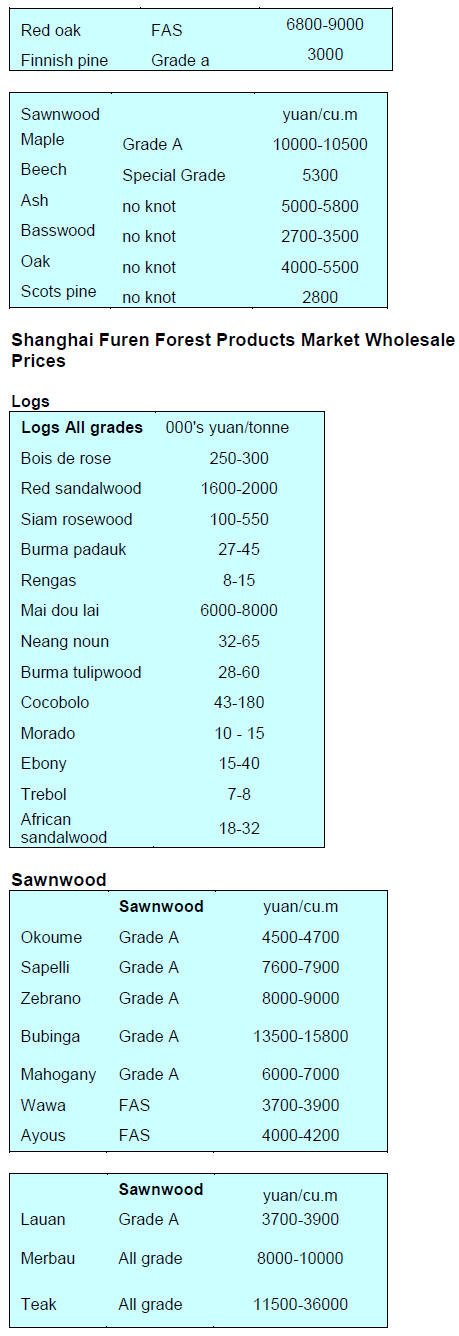US Dollar Exchange Rates of
25th September
2015
China Yuan 6.3754
Report from China
Real estate investment slows further
The National Bureau of Statistics has released data for first
eight months investment in real estate. Total investment in
real estate development in the first eight months of this
year increased 3.5% year-on-year but the pace of
expansion continues to fall.
Investment in residential buildings in the first eight
months was up by 2.3% year on year and accounted for
67.3% of all investment in real estate.

In the first eight months, real estate investment expanded
3.7% in the eastern region, by 3.5% in the central region
and by 3.3% in the western region.
See:
http://www.stats.gov.cn/english/PressRelease/201509/t20150915
_1245080.html
On a more positive note, towards the end of September
data compiled by JL Warren Capital indicate that sales of
second hand homes have jumped and the main driving
force for this was the decision by the Chinese government
to open the taps to further credit growth.
Cooperation between Qingdao and Kuantan Port
Qingdao Port authorities have signed a cooperation
agreement with the management of Malaysia¡®s Kuantan
Port which the Chinese side sees as strategically placed
along the ‗Maritime Silk Route¡® a new concept to enhance
trade.
The two sides have agreed to strengthen cooperation in
port development and construction, operation and
management, staff training and efficiency improvement.
The Chinese see Kuantan Port as an important maritime
port and logistics centre serving the east coast of the
Malay Peninsula. New investment amounting to around
RMB8 billion will be invested in expanding Kuantan Port.
On completion of the planned construction Kuantan Port
will become the largest port on east coast of Malaysia
which could offer new opportunities for the timber trade.
Furniture manufacturers in Beijing face penalties for
releasing pollutants
A fine will be imposed on industrial enterprises, including
furniture makers, in Beijing found releasing volatile
organic compounds (VOCs) into the environment, this
new regulation on VOC emissions came into effect on 1
October this year. This pollution regulation and
accompanying system of fines for releasing VOCs is a first
for China and will affect around 2000 enterprises in the
capital.
The aim of the initiatives is to encourage enterprises to
update their technology to reduce pollution. The VOC
discharge fees will be levied by the environmental
protection departments at all districts and counties level.
According to the Beijing Municipal Environmental
Protection Bureau, VOCs emissions from five major
industry sectors account for about 80% of the total
emissions in the city. Emissions from petrochemical
industries are high but other sectors including wood
processing are to be targeted.
First half wood based panel output climbs
According to the statistics from China National Statistics
Bureau wood based panel output rose 5% to 144 million
cubic metres in the first half of 2015.
The top 10 provinces in terms of wood based panel output
are shown in the following table. In the first half of 2015
the value of China¡®s wood-based panel exports fell 10% to
RMB14.145 billion yuan.

Strategic alliance between Malaysian and Guangdong
timber sectors
The Malaysian Wood Industries Association (MWIA) has
released a statement signalling further progress with the
¨DOne Belt One Road¡¬ Malaysia-China Economic
Initiative.
This initiative marked another milestone with the signing
of the Memorandum of Understanding (MOU) between
the MWIA, The Timber Exporters¡® Association of
Malaysia (TEAM) and the Guangdong Timber Industry
Association (GTIA) on 20th September 2015.
The aim of this MOU is to develop and promote timber
trade cooperation between Peninsular Malaysia and China.
The MOU was signed by Dato' Low Kian Chuan, the
President of MWIA, Mr.. George Tan, the President of
TEAM, and Mr.. Zhang Jianmin, the President of GTIA.
The signing was witnessed by Mr.. Zhu Xiaodan, the
Governor of Guangdong and Tan Sri Ong Ka Ting, the
Prime Minister's Special Envoy to China.
The MOU is expected to lead to increased cooperation
between the timber trade associations of Peninsula
Malaysia and Guangdong Province in a wide range of
areas which could provide opportunities for Malaysian
timber product manufacturers to enter lasting trade
relations with importers of the Guangdong Province.
Among the initiatives covered in the MOU are: building a
timber trading platform between Malaysia as suppliers of
various wood products and Guangdong marketing
channels, to promote Malaysian timber products to the
Guangdong Province, as well as to develop unified
specifications that will satisfy specific timber trade
requirements in Guangdong Province.
Guangdong is home to many wood processing industries
which consume are high proportion of imported wood
products. Wooden furniture exports accounts from
manufacturers in Guangdong account for around 50% of
the national exports.
A large proportion of the raw materials for furniture
manufacturers in Guangdong come from Southeast Asia,
especially Malaysia. It is forecast that demand for
imported timber in Guangdong Province will continue to
grow.
For more information contact Ms. S K Pang
mwia@mwia.com.my
   
|